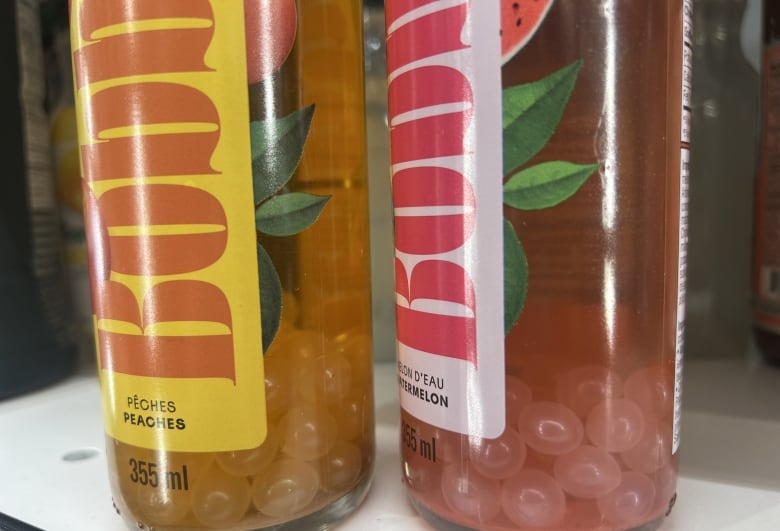
A Canadian company has apologized following an appearance on CBC’s Dragons’ Den, during which celebrity judge Simu Liu expressed concerns that the brand was culturally appropriating a Taiwanese beverage.
The company, Bobba, sells a bottled version of the drink boba tea, or bubble tea, which is typically made of cold tea and chewy tapioca pearls. It originated in Taiwan during the 1980s before it became popular in North America.
Quebec City entrepreneurs Sebastian Fiset and Jessica Frenette appeared on the show seeking a $1-million investment in exchange for 18 per cent of their business, pitching their version of the popular drink as a “convenient and healthier ready-to-drink experience.”
They touted their brand’s popping boba pearls and an alcoholic version of the beverage.
Liu, a Chinese Canadian actor and investor, said he was concerned about “this idea of disrupting or disturbing bubble tea,” adding that it was a matter of cultural appropriation, which is when a majority adopts the customs or culture of a minority in a way that can be perceived as inappropriate or insensitive.
“There’s an issue of taking something that’s very distinctly Asian in its identity and quote-unquote ‘making it better,’ which I have an issue with,” said Liu.
Fiset, referring to the product’s mainstream popularity, said that bubble tea is “not an [ethnic] product anymore.”
Clips from the reality TV episode went viral on social media, with some users attacking Fiset and Frenette for the appearance. The company took to Instagram to apologize, saying that it was never their intention to “harm or disrespect the community that created and popularized this beloved drink.”
“At no point did we mean to insinuate that our Bobba bubble tea is better than traditional bubble tea in any way,” the statement read.
One marketing expert says that, in the age of swift social media backlash, the company might have to change their branding to recover from the incident.
“I think on a mass audience perspective, it’s for sure going to impact their brand image. I think apologizing is a good start and acknowledging the issue is a good start,” said Aleena Muzhar Kuzma, a branding expert in Whitby, Ont., and a senior vice-president, managing director and partner at marketing agency FUSE Create.
But she said the company has some work to do after the fallout from the episode — which included Dragons’ Den investor Manjit Minhas announcing that she has pulled her investment in Bobba in response to criticism.
“Be clear on how you are not appropriating Asian culture and you’re actually respecting it and potentially have advisors from the community,” said Kuzma.

‘Where boba came from is Taiwan’
Kuzma said that, as the entrepreneurs spoke about the brand, “there was a lack of declaration on what actually makes boba, or bubble tea, special and why it’s a huge industry right now.”
Long considered a Taiwanese staple, bubble tea emerged from Taiwan’s local tea shops before spreading elsewhere across Asia. It became especially prevalent in North America during the 2010s when tea brands saw a resurgence in popularity. The bubble tea industry in the U.S. was valued at $2.6 billion US in 2024 by market research firm IBISWorld.
“I think that that brand story needs to tie back to heritage and culture and where this product actually came from in a more authentic way,” she added.
After Liu asked how the company was paying respect to the drink’s Taiwanese origins through their product development and staffing decisions, Fiset noted that the company works closely with a supplier and recipe developer in Taiwan.
But Liu, during his final assessment, said he wasn’t going to invest in the company: “I am studying your can, and I am looking for anything that tells me where boba came from. And where boba came from is Taiwan.”
Noting that he wants to uplift entrepreneurs from minority communities, Liu said, “Not only do I feel like this is not happening here, but that I would be uplifting a business that is profiting off of something that feels so dear to my cultural heritage.”
“I want to be a part of bringing boba to the masses, but not like this. So for that reason, I’m out.”
Carmen Cheng, a Vancouver-based Chinese Canadian food writer and equity consultant, says she grew up drinking bubble tea.
“When we’re thinking about culturally ethnic foods, oftentimes people from the cultures in Canada or North America are made fun of for our food, our norms, our customs, our dress, our appearance.
“And then you have someone who maybe, quote-unquote, ‘makes it better,'” she said.
She said she can see how that mindset could be perceived as transformative or innovative. “We’re bringing new takes of certain things to market. And that sounds like a great thing,” she said.
“But I think when we think about appropriation, we’re thinking about taking from a culture in a way where there’s a difference in power dynamic and maybe even an imbalance in how the culture is perceived.”
In its social media apology, Bobba alleged that the company had been subjected to hate speech and that its founders were receiving death threats as part of the backlash. CBC News has not been able to independently verify the allegations.
CBC News has reached out to Bobba and to CBC for comment.
“Dragons’ Den brings investors and entrepreneurs together to learn from one another through honest feedback and healthy debate,” wrote Chuck Thompson, head of public affairs at CBC. “This particular segment has sparked an important conversation but unfortunately a lot of online bullying of show participants at the same time.”
“Many people have shared their thoughts and opinions in a respectful manner but we certainly do not condone the hurtful comments made by others. We support the calls for this harassment to stop immediately.”